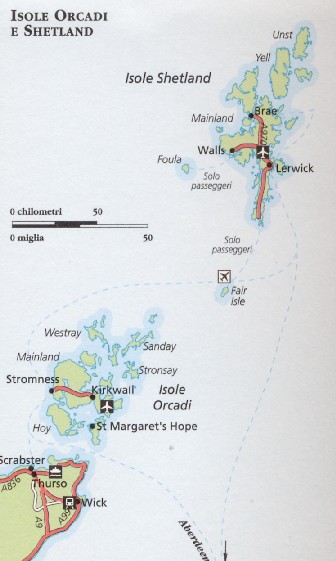
|
SHETLAND E ORCADI, SCOZIA (UK) 1982, UN PROGETTO ANTROPOLOGICO |
di Franco Pelliccioni, Società Geografica Italiana, Roma

BIBLIOGRAFIA
2007 "Il padre dell'archeologia preistorica. Cinquant'anni fa moriva Gordon Childe uno dei massimi studiosi di scienze umane dell'età contemporanea" OR [L'Osservatore Romano]Domenica, 16 dicembre, 6 [Skara Brae, Orcadi]
2006 "Le "Capitali" Nord-Atlantiche della Pesca: Kirkwall, Isole Orcadi, Scozia", Rivista Marittima, CXXXIX, agosto-settembre, 177-181
2006 "Lerwick, Isole Shetland, Scozia. Le capitali della pesca", Rivista Marittima, CXXXIX, maggio, 183-86
2006 "Kirkwall, la vichinga "baia della chiesa" un tempo patria dei "contadini che pescano". Viaggio tra storia e attualità nel capoluogo delle isole Orcadi", L'Osservatore Romano, 6-7 febbraio, 3
2006 "Aringhe e balene: i "tesori" del mare di Lerwick antica capitale della pesca nell'Atlantico del Nord. Un viaggio alla scoperta del capoluogo delle Shetland, in Scozia", L'Osservatore Romano, 12 gennaio, 3
2004 "Naufragi nelle isole Shetland", Rivista Marittima, CXXXVII, agosto-settembre, 217-221
2004 "Al riparo dalle tempestose acque dell'Atlantico Stromness era per i Vichinghi la "baia buona". In passato la città dell'arcipelago scozzese delle Orcadi ha svolto un ruolo importante nel commercio del Nord Europa", L'Osservatore Romano, 3 Ottobre, 13
2004 "Più di mille relitti raccontano dai fondali la storia delle tormentate acque delle Shetland. Dall'epoca vichinga ai giorni nostri l'arcipelago scozzese è stato il luogo di una continua serie di naufragi. L'apra conformazione rocciosa, la frastagliatura della lunghissima linea costiera, la presenza di innumerevoli scogli sottomarini, la posizione aggettata verso l'aperto Atlantico, la latitudine settentrionale con il conseguente clima caratterizzato da tempeste, raffiche di vento gelo e neve hanno fatto sì che le acque delle Shetland abbiano costituito una trappola mortale per i naviganti che seguivano le grandi rotte oceaniche ma anche per gli esperti pescatori locali", L'Osservatore Romano, 9 settembre, 3
2004 " Frotte di "sub" si aggirano sul basso fondale marino per fotografare i relitti di decine di navi inglesi e tedesche. Una visita alla base navale britannica di Scapa Flow nelle Isole Orcadi", L'Osservatore Romano, 20 agosto, 3,
2003 "Solo lacrime e dolore a Fair Isle nel 1897, "anno del disastro". Il resoconto di un dramma del mare avvenuto a fine Ottocento nelle isole Shetland", L'Osservatore Romano, 3 Dicembre, 3
2003 "Le fredde terre scozzesi del XVIII secolo erano divenute un feudo di pirati e contrabbandieri. Un viaggio tra storia e leggenda nell'arcipelago delle Orcadi", L'Osservatore Romano, 14 novembre, 3
2002 "Le isole Shetland la pirateria", Rivista Marittima, CXXXV, marzo, 209-212
2002 "La pirateria e le Orcadi", Rivista Marittima, CXXXV, gennaio, 202-206
2001 "Il petrolio prima o poi finisce: la pesca, i campi e l'allevamento sono ancora il nostro futuro…". Le scozzesi isole Shetland: qui la natura e le antiche tradizioni hanno resistito alle trasformazioni industriali", L'Osservatore Romano, 16 Marzo, 3.
2001 "Storia di una comunità marittima: Stromness", Rivista Marittima, CXXXIV, 219-222
2001 "Tra resti di villaggi preistorici e imponenti megaliti sulle dolci colline che conobbero il dominio vichingo. Un viaggio nell'arcipelago scozzese delle Orcadi", L'Osservatore Romano, 21 Gennaio, 3.
1998 "Il Museo del Mondo. Isole Orcadi", Storia e Dossier, XIII, 129, luglio-agosto, 52-57
1995 "Alle Isole Shetland d'inverno, un arcipelago "norvegese" in terra scozzese", L'Universo, LXXV, 5, settembre-ottobre, 663-679
The author, deeply interested in the cultural change problems, that may regard, not only "exotic" peoples and Third World's countries, but also peoples and situations nearer, in the geographical and cultural way, to him (in an European context, for istance), in this article carries out a comprehensive analysis of the economic-social and cultural situation he found out in the Shetland Isles, Scotland (U.K.). This archipelago has been deeply influenced for centuries, by a Viking life-style, which has taken its strong roots in several and important Shetland fields: language, surnames, traditional folklore (of course), and so on. Shetlanders, peoples of Viking origin, have faced , during the '70 and '80 (and still nowadays) the North Sea oil and gas search and production. Compared to the Orkney's situation, Shetlanders should have been much more involved in this new business , that could really had a greater and ravaging impact in every aspect of their traditional community life. The fishermen-crofters Shetlanders had already experienced, however, since the '60, a big challenge, which affected for the second time in a century, sheep-farming ( which resulted in a bigger production of the famous Shetland wool and woollen handicrafts:sweaters, tweeds,and so on). The author, that afterwards had the chance, in "real time", to get an outline also of the parallel situation existing in the more southern Orkney Islands , has found out that cultural changes in Shetland are minimal, like in the Orkney communities. Indeed this was a very interesting scientifical surprise to him, because many concerned peoples have always thought that massive oil production ( and the money coming from it), could give a strong contribution, somehow, to the cultural disintegration of Shetland's communities. This already happened at the end of the XIXth century, after the rude crofters clearances. But Shetlanders know very well that oil isn't a sure thing to rely on, forever, and they did invest oil royalties on the more traditional fields, like fishing, crofting, sheep farming, improving the inter-islands communication systems, and so on. Shetland has changed very little, and if it did so, it should be said that the archipelago is as wild, natural and traditional as it was, likely, before the North Sea oil strike
[http://users.iol.it/f-pelli/f-pelli.shetland-orcadi.htm]
Le Mappe
/
Orkney 1 / Orkney 2 / Shetland /Lerwick /LINKS
Shetland Isles Council / Shetland Info / Shetland Weather / Shetland Times / Shetland Museum /
Orkney Info / Orkney Info 2 / Orkney Virtual Tour / Orkney History / Skara Brae / Weather / Environment / Internet / Sigurd Towrie Page
Autunno presso la
: Scottish Tourist Board / Highland Music Real Audio /MOTORI DI RICERCA
ITALIANI
:ARIANNA / VIRGILIO / IL TROVATORE /
REGIONALI
INTERNAZIONALI
LA PRINCIPALE PAGINA WEB IN LINGUA ITALIANA DI FRANCO PELLICCIONI:
PROGRAMMA COMUNITA' MARITTIME ATLANTICO SETTENTRIONALE
(In English: Northern Atlantic Maritime Communities Program)
Creata: 21 gennaio 2000
Modificata: 14 febbraio 2006